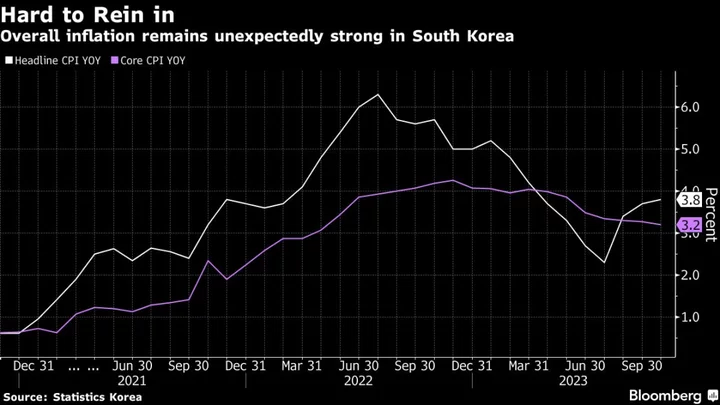South Korea’s inflation unexpectedly accelerated in October, reinforcing the case for the central bank to keep its restrictive policy in place for longer.
Consumer prices advanced 3.8% from a year earlier, with the pace of growth quickening compared with 3.7% in September, the statistics office reported Thursday. Economists surveyed by Bloomberg had expected inflation to come in at 3.6%.
The reading was at odds with the Bank of Korea’s view that inflation would start to slow from October after having risen for a couple of months. With the policy focus remaining on prices, the central bank has been keeping the door open to another possible rate hike from the current 3.5%, a level it already characterizes as restrictive.
The bank is also wary of elevated borrowing costs weighing on economic growth. One board member said last month that the BOK should also be open to the possibility of cutting rates if needed, in the first sign of dissent over the trajectory of policy in months.
Adding to the complexity of the policy equation is the Israel-Hamas conflict, which threatens to boost oil prices if it broadens into regional hostilities. BOK Governor Rhee Chang-yong has said the conflict has thrown growth forecasts for 2024 into question.
Inflation is expected to ease more slowly than previously expected due to the Mideast risk and unusually low temperatures, Finance Minister Choo Kyung-ho said just before the price data were released. He also pointed out, however, a stable trend in prices excluding food and energy, growth of which slowed to 3.2% from the 3.3% gain in September.
The price data come as a rebound in exports and industrial production reaffirms confidence among authorities that the Korean economy will grow largely as expected this year. With the US economy also showing surprising growth, the BOK considers it too early to talk of relaxing its stance.
A key factor for what comes next will be the Federal Reserve. Chairman Jerome Powell hinted Wednesday that the US central bank may now be finished with the most aggressive tightening cycle in four decades.
The BOK likely wants to see stable inflation readings in the 2% range before considering any policy easing. Inflation is likely to slow to that range next year, the BOK has said, with a growing number of economists expecting a rate cut some time after that.
A rekindling of appetite for household debt is another reason the BOK is expected to keep its rate restrictive. A tight policy also helps prevent the local currency from weakening further against the dollar and ramping up the nation’s import bill.
(Adds a chart, details and finance minister comment)

